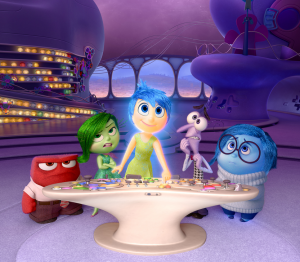 Have you seen the new movie, “Inside Out“? If not, I highly recommend it. As many of the movie critics say, it’s much more than a kids’ movie. Honestly, it’s probably not even that entertaining for kids under age 6 or 7 as it is somewhat slow moving in the beginning while they establish the assumptions that they’ll use for the workings of the human mind and our emotions.
Have you seen the new movie, “Inside Out“? If not, I highly recommend it. As many of the movie critics say, it’s much more than a kids’ movie. Honestly, it’s probably not even that entertaining for kids under age 6 or 7 as it is somewhat slow moving in the beginning while they establish the assumptions that they’ll use for the workings of the human mind and our emotions.
One of the reasons why this film is so delightful is that it brings us face-to-face with the complicated cast of characters (our emotions) that are busy formulating our impressions of the world and how we interact with it. The movie doesn’t shy away from the complexity of our emotions, our personality, and how a significant event in our lives (in this case, moving to a new city and leaving one’s friends) can chip away at the core parts of who we are and make some emotions, that previously were playing minor roles, major characters in our life. All of this can lead us to act in unexpected and uncharacteristic ways that can lead to a turn point or rebuilding of our core selves.
At the beginning of the film, we are entertained by the energetic and, literally, glowing, “Joy.” She is clearly in control of the emotional and mental life of Riley, the 11 year old girl who is experiencing this dance of emotions, mental development, and the upheavals of moving to a new city. Joy oversees command central and makes sure things run in a largely positive manner, including making sure each day ends in a joyful moment.
I found Joy to be a happiness tyrant who belittles Sadness and dismisses Fear to the point where I felt bad for them and wanted her to treat them better — making sure they are heard (and felt!). One example of Joy’s over-the-top approach is when Sadness touches a core memory and turns it from the glowing gold of a joy memory to the blue of a sad memory. Joy approaches this as a tragic event. Though as the story unfolds, Joy learns the value of Sadness. Indeed, one of the beautiful, yet subtle, messages of the movie, from my perspective, is that Joy and Sadness are always together. They go hand-in-hand in the movie and in our lives. It’s not Joy OR Sadness. It’s really Joy AND Sadness.
Sadness also demonstrates her value when she helps a despondent, Bing Bong (Riley’s childhood imaginary friend). Bing Bong is filled with sadness and cannot carry-on with his task. Joy is beside herself about what to do. The situation is resolved when Sadness sits down next to Bing Bong and simply listens to him and what he is thinking and feeling. After she does this Bing Bong is ready to continue on his way. Joy is full of wonder about how Sadness did that, and Sadness shrugs and says, “I just listened to him.” What a great example of how the simple act of listening and being with our sadness can have such a profound impact on how we’re able to act in the world.
Another delightful aspect of this film comes at the end when Riley is 12 years old and the inner workings of her mind and the control console are far more complex than they were a year before. I think this is a wonderful representation of the growing complexity of the human mind and our emotional life as we develop from childhood to adolescence. It also seems to make room for the many other emotions that we experience beyond the five (Joy, Sadness, Fear, Anger, and Disgust) represented in the movie.
I hope you’ll have the chance to see the movie, “Inside Out.” If you do, make sure you bring a hankie or two.

